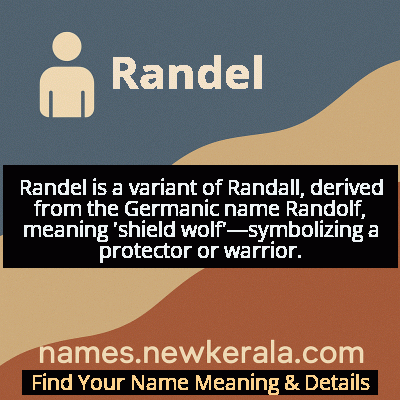Randel Name Meaning & Details
Origin, Popularity, Numerology Analysis & Name Meaning of Randel
Discover the origin, meaning, and cultural significance of the name RANDEL. Delve into its historical roots and explore the lasting impact it has had on communities and traditions.
Name
Randel
Gender
Male
Origin
Christian
Lucky Number
9
Meaning of the Name - Randel
Randel is a variant of Randall, derived from the Germanic name Randolf, meaning 'shield wolf'—symbolizing a protector or warrior.
Randel - Complete Numerology Analysis
Your Numerology Number
Based on Pythagorean Numerology System
Ruling Planet
Mars
Positive Nature
Generous, passionate, energetic, and humanitarian.
Negative Traits
Impulsive, impatient, moody, and can be overly emotional.
Lucky Colours
Red, maroon, scarlet.
Lucky Days
Tuesday.
Lucky Stones
Red coral, garnet.
Harmony Numbers
1, 2, 3, 6.
Best Suited Professions
Military, sports, philanthropy, leadership roles.
What People Like About You
Courage, energy, leadership, generosity.
Famous People Named Randel
Randel Helms
Biblical Scholar and Author
Professor emeritus at Arizona State University known for his critical analysis of biblical texts and authorship of 'Gospel Fictions'
Randel Shade
Musician and Composer
American composer known for his work in film scores and contemporary classical music compositions
Randel Plowman
Artist and Curator
American collage artist and curator known for founding The Aesthete Blogger and his innovative mixed-media artworks
Randel McGee
Puppeteer and Ventriloquist
Professional puppeteer known for his educational performances and ventriloquism shows across the United States
Name Variations & International Equivalents
Click on blue names to explore their detailed meanings. Gray names with will be available soon.
Cultural & Historical Significance
As Christianity spread throughout Europe, many traditional Germanic names like Randel were adapted and continued in usage, maintaining their cultural significance while being incorporated into Christian naming traditions. The name's survival through centuries demonstrates its enduring appeal and the way naming traditions evolve while preserving historical connections. In modern times, Randel serves as a link to ancient European warrior cultures while fitting comfortably within contemporary Christian naming practices, representing a bridge between pagan Germanic traditions and later Christian influences.
Extended Personality Analysis
Individuals named Randel are often perceived as strong, protective, and loyal personalities. The name's meaning of 'wolf's shield' suggests someone who combines the wolf's intelligence, social nature, and fierce loyalty with the shield's protective qualities. Randels are typically seen as natural leaders who take responsibility for protecting those in their care. They often exhibit a balanced personality—assertive when necessary but fundamentally protective and caring.
The wolf symbolism indicates strong family and community bonds, while the shield element suggests reliability and steadfastness. Many Randels display strategic thinking, patience, and the ability to assess situations carefully before acting. They tend to be dependable friends and partners who value deep, meaningful relationships over superficial connections. Their protective nature often extends beyond physical protection to emotional support and guidance for those they care about. This combination of traits makes Randels often sought as trusted advisors, reliable team members, and steadfast companions who balance strength with compassion and intelligence with action.
Modern Usage & Popularity
In contemporary naming practices, Randel maintains a distinctive presence as an uncommon but recognizable choice. While its popularity peaked in the 1950s and 1960s, it has since become increasingly rare, making it an excellent option for parents seeking traditional names that stand out from current trends. The name's strong Germanic roots appeal to families with European heritage, while its straightforward pronunciation and spelling make it accessible across English-speaking countries. Current usage data shows Randel ranking outside the top 1000 names in most English-speaking countries, giving it an exclusive quality. The name works well in professional contexts, sounding established and substantial without being overly common. Many modern parents choosing Randel appreciate its historical depth, strong masculine qualities, and the meaningful combination of protective and loyal characteristics embedded in its etymology.
Symbolic & Spiritual Meanings
Symbolically, Randel represents the harmonious balance between opposing forces—strength and protection, action and defense, individuality and community. The wolf element embodies intelligence, social structure, loyalty to the pack, and strategic prowess, while the shield represents security, boundaries, resilience, and guardianship. This combination creates a powerful metaphor for ideal leadership: the ability to both advance and protect, to be both fierce and caring. In psychological terms, the name suggests someone who understands the importance of both personal strength and communal responsibility. The symbolic meaning extends to concepts of wise protection—knowing what to defend and how to defend it effectively. This dual symbolism makes Randel particularly meaningful in contexts that value both individual achievement and community welfare, representing the ideal of the guardian who uses strength wisely and protects thoughtfully.

